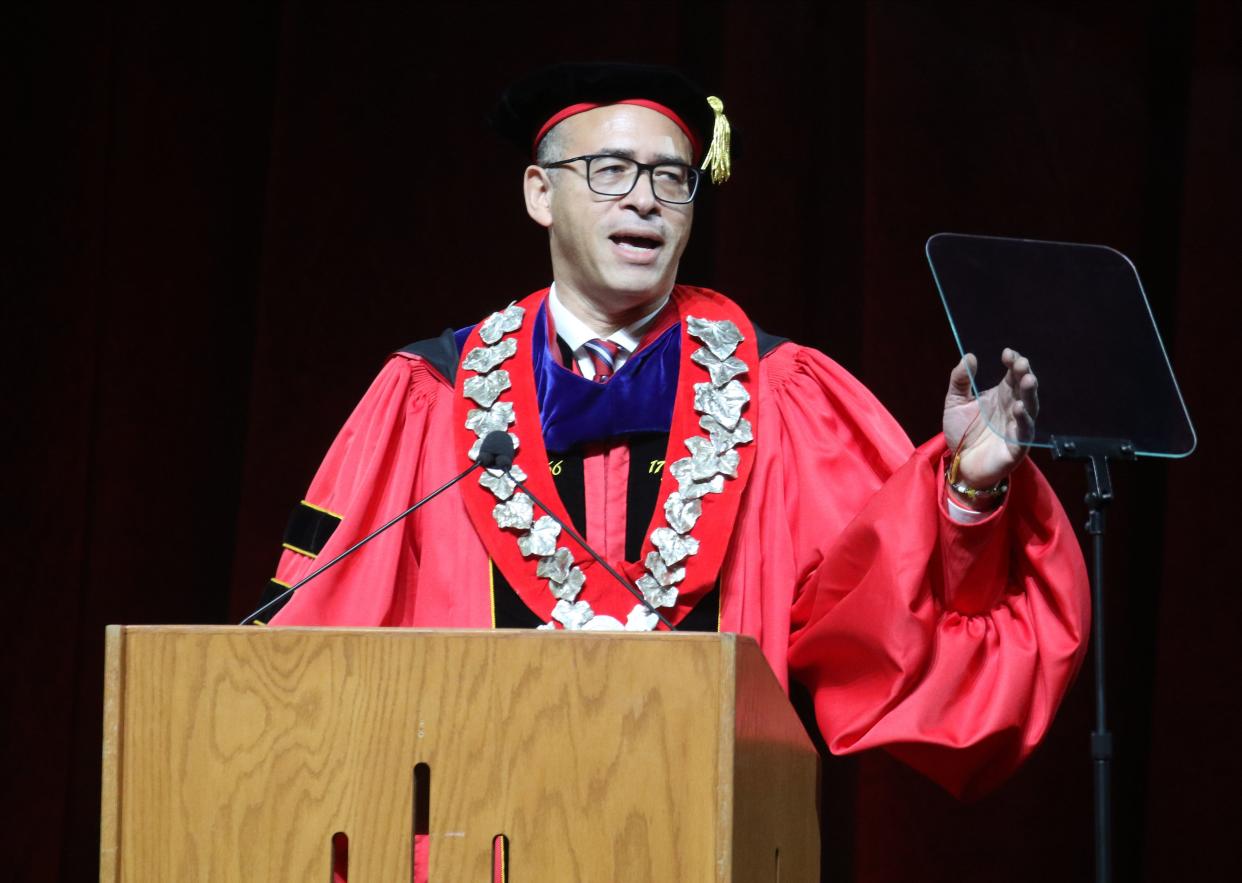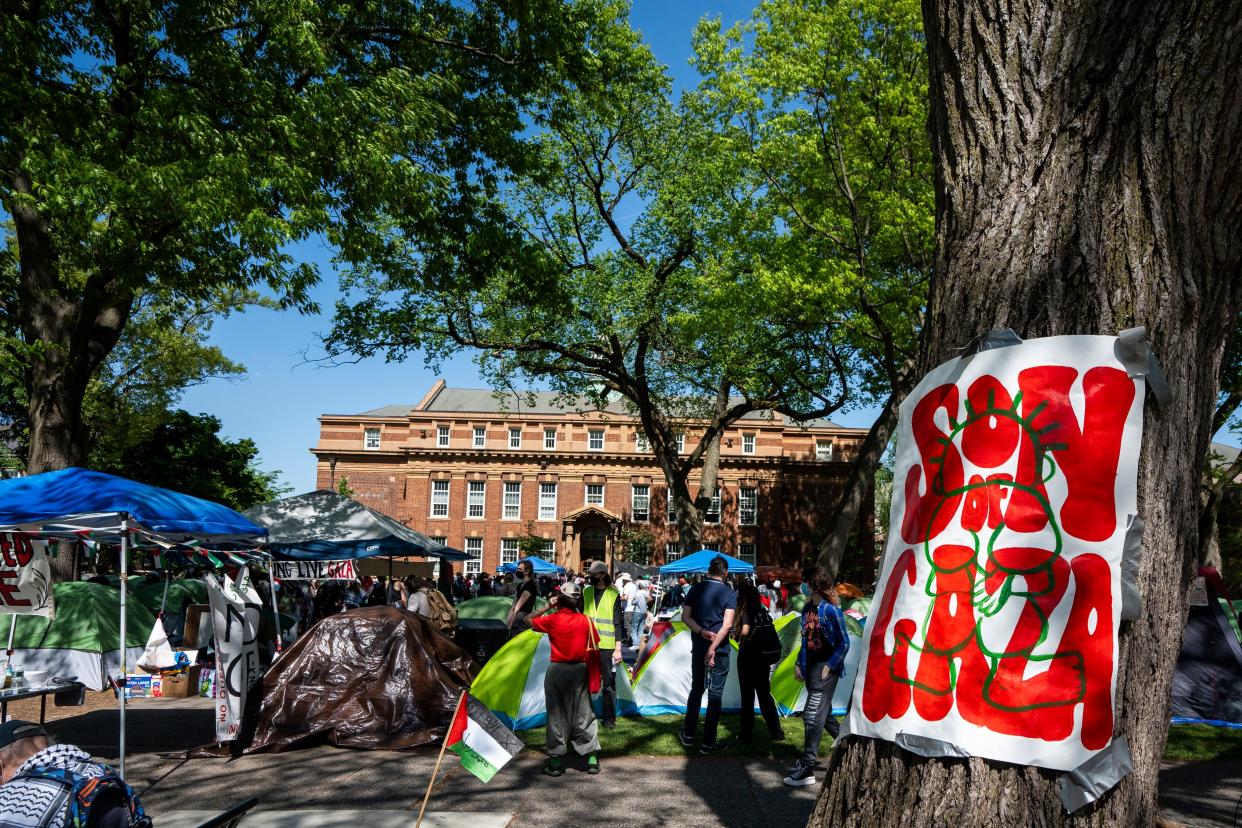Rutgers University president defends decision to negotiate with student protesters
Rutgers President Jonathan Holloway publicly defended his decision to negotiate with student protesters who pitched tents in a pro-Palestinian encampment in New Brunswick last week — negotiations that ended in an agreement and the protesters closing down the encampment.
In comments made at a "special" Board of Governors meeting convened Monday via Zoom, Holloway said he was responding to the "thousands of emails" he received from the public after the university announced Thursday that it had agreed to several of the students' demands, ending the four-day encampment.
"I am confident in our decisions," Holloway said. "They allowed us to maintain a safe and controlled environment, to protect Rutgers students and Rutgers property, and to assure that our students’ academic progress — taking finals and completing the semester — was not impeded."

He emphasized prioritizing student safety and exams, mentioning the same words twice in his statement. The concessions the university made — such as agreeing to conduct cultural training and set up an Arab cultural center — would be handled by the chancellor’s Advisory Council on Arab, Muslim, and Palestinian Life, he said.
The agreement arrived as finals were starting, permitting a peaceful end to the semester and setting Rutgers apart from many campuses where the protests have damaged property, disrupted classes and left students feeling unsafe.
Northwestern University in Evanston, Illinois, became the first U.S. school to announce a deal with protesters, followed by Brown University's announcement on Tuesday of an agreement with student organizers to curb protest activity on the Ivy league campus in Providence, Rhode Island, in exchange for Brown's Corporation voting on a divestment measure in October.
Columbia University on Monday announced that it was canceling its main commencement ceremonies, after confrontations between New York City police and protesting students ended with multiple arrests.
Guiding principle to protect Rutgers students
Holloway asserted that his guiding principle in agreeing to several items on a 10-point list of demands was to protect Rutgers students and allow them to complete their finals in a stable environment. He put the Gaza protesters in context, saying they weren't the first ever and that similar protests took place on Voorhees Mall in the last 20 years on issues ranging from the environment to tuition.
"But by Thursday morning, this year’s protest had become disruptive," Holloway said.

On Thursday, the university canceled final exams scheduled for the morning, saying in an email that it anticipated an escalation of the protests.
"Some people have said I should have engaged police to clear the protest and arrest those who resisted. We were prepared to do so. I am grateful that we did not have to," he said.
"Since Voorhees Mall was cleared, I have received thousands of emails in which people express their frustration or dismay," Holloway said. "To everyone who wrote, I hear you. I know that many of the decisions that we made last week are challenging."
The student protesters applauded themselves for moving to disrupt exams. "We forced the university to cancel 28 finals and were ready to face arrest," the two campus organizations leading the encampment said in a statement released to media outlets last week.
Preserving campus's 'delicate peace'
Holloway did not refer to the student movement's characterization of its actions but focused on the bigger picture of how this has played out on campuses nationwide, saying his administration wanted to preserve the campus's "delicate peace."
"For weeks we have watched universities struggle to respond to unrest and violence on campuses across America," Holloway said. "Schools that appear stable one day are overwhelmed the next. My leadership team and I have cautiously believed that Rutgers can be different, indeed that Rutgers is different, and that we can maintain our delicate peace."
"By Thursday afternoon, the mall was an unstable mixture of protesters and counterprotesters that we have seen far too often on other campuses," he said. "Some participants were our own students, faculty and staff; others were outsiders in pursuit of their own goals and ambitions. It was clear to me that we had to take some action before the situation veered toward violence."
Holloway said he did not accede to key demands from student protesters — to have Rutgers stop investing in companies that "do business in Israel" and to sever ties with Tel Aviv University.
He said he did not support divestment, saying that "enlightenment comes from involvement and that lasting progress and peace are the outcomes of diplomacy and discussion."
A key demand of the nationwide student protests on university campuses is that universities disinvest their endowment funds from profits made by investments in Israeli companies; some protest camps have demanded that divestment include Google and Amazon, which have offices in Israel. Others call to boycott Israeli cultural organizations.
Some Rutgers students interviewed at the encampment demanded disinvestment from Boeing and Caterpillar.
Holloway also committed to maintaining ties with an Israeli university while agreeing to protesters' demands that the university bolster ties with a Palestinian school, Birzeit University in the West Bank. "There also appears to be a misunderstanding about our relationship with Tel Aviv University. We were asked to sever that relationship. We will not. Period."
He said the university would continue to pursue harassment and bias investigations on campus, highlighting an arrest made in an investigation into the vandalization of the Rutgers Islamic Center and the charging of two students in the targeting of a Jewish student in Demarest Hall.
He also indicated that while it would address Palestinian protesters' demands, the university would also address "gaps in our Jewish student, faculty and staff experience" by working with another campus council: the Advisory Council for Jewish Life.
This article originally appeared on NorthJersey.com: Rutgers president defends choice to negotiate with protesters
